
How to Write an Informative Essay: Topics, Structure, and Examples
Yeah, we know. Essays. Again.

We’ve already covered many essay types: persuasive, critical, narrative, you name it! The time has come for informative essays to appear on this blog.
What to do if a teacher assigns this type of academic writing? How to write an informative essay so it would be worth getting A+?
Here you’ll find the ultimate guide on writing informative essays, including the tips on choosing a topic, writing an outline, structuring it step by step, and examples to check for better essay writing.
Table of Contents:
What is an Informative Essay?
Informative essays aren’t about your subjective opinion or personal viewpoint. Your goal here is not to persuade a reader but tell them about a topic: define a term, analyze data, provide a how-to guide on something, or compare/contrast a subject.
Examples of such writings are textbooks, leaflets, and brochures — texts that inform a reader in a neutral manner. You should write an informative essay in an objective tone and avoid the first person pronouns (I, we).
Sounds too challenging?
You can always ask Bid4Papers professional writers for assistance. Choose a writer with the knowledge and skills that meet your needs best:
 When writing an informative essay, remember the knowledge level of your audience. It’s unnecessary to over-explain concepts and terms to people who are already experts in the subject, and it’s okay to do that if you write for novices.
When writing an informative essay, remember the knowledge level of your audience. It’s unnecessary to over-explain concepts and terms to people who are already experts in the subject, and it’s okay to do that if you write for novices.
Purpose
The purpose of an informative essay is to educate the reader, providing them with facts and clear explanations on the subject. You don’t argue, and you don’t try to persuade; you share terms and data, compare and contrast facts surrounding the subject, describe, explain how to do something, etc.
Your goal is to leave a reader with in-depth information on a topic. They need to feel educated after they’ve read your essay.
Fun fact: You're reading an informative essay on how to write an informative essay. The purpose is to educate you about the process. We share terms and facts, describe, and explain them step by step, willing to provide in-depth information on the issue.
The problem with informative essays is they look like several other essay types: narrative and expository. Some experts even classify them as the same type of writing, though slight differences between all three have a place to be:
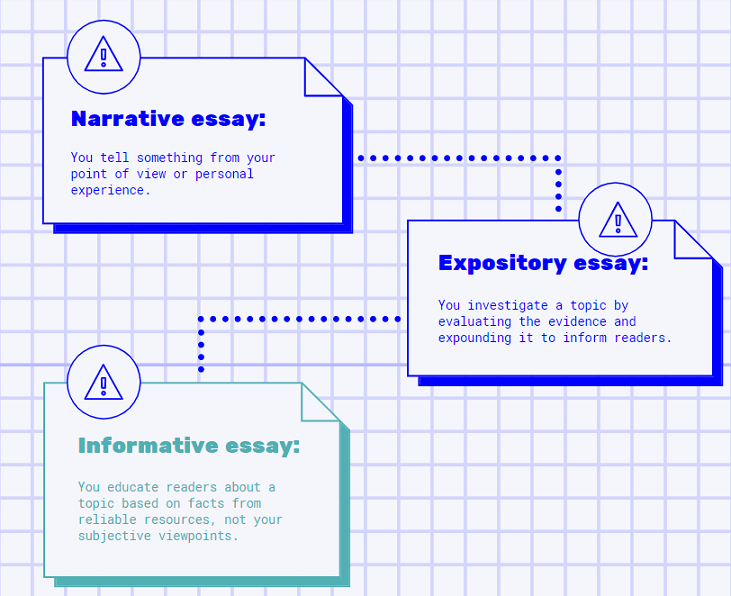
As a rule, students confuse informative essays with expository ones because of the same purpose: to educate readers and explain something to them. But:
- An expository essay defines a single side of an issue, which looks like the first step to writing an argumentative essay.
- In its turn, informative papers are less complicated, requiring less research and focusing on general info about an issue.
Types
Since a purpose of an informative essay is to present the info and educate a reader, many types of academic papers can relate to it. We’ve already mentioned narrative and expository writings, with core differences between them:
Narrative essays are about personal experiences and viewpoints, and expository essays are more about explaining something, not just providing info about it.
Below are five variations that can be informative essays as long as they just provide info rather than try to persuade a reader about something:
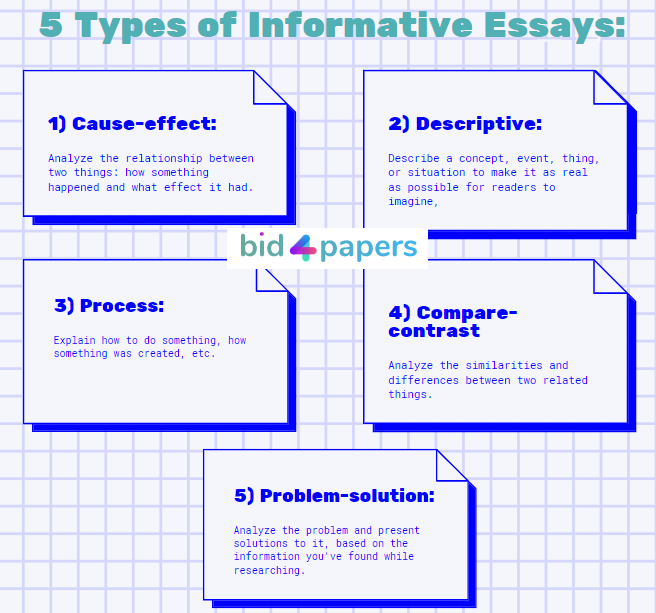
Five common types of informative essays:
- Cause-effect essays: give the connection between two things. These essays can be argumentative if you establish cause and effect, but they are informative if you analyze connections.
- Descriptive essays: tell about a person, event, or situation to make readers imagine it.
- Process essays: explain how something appeared or how to do this or that thing.
- Compare-contrast essays: tell about the similarities and differences between two related things.
- Problem-solution essays: describe a problem and share solutions to it. These essays can be persuasive if you try to represent one solution better than others, but they are informative if you present various possible solutions.
The Structure of an Informative Essay
The structure of your informative essay is not that difficult to remember and follow.
It reminds a standard five-paragraph essay:
You start with an introduction, write a few (usually three) paragraphs to present the main ideas and support them with evidence and facts, and finish with a conclusion summarizing all the claims, restating a thesis, and sharing some final thoughts.
More details: How to Start an Informative Essay
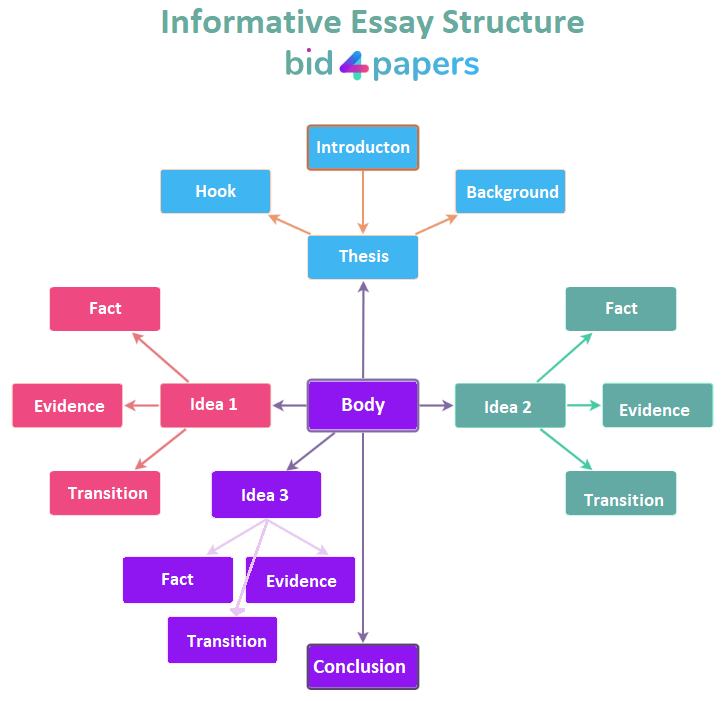
- Introduction: hook, background, thesis statement.
- Body: 3 paragraphs, each representing an idea supported with evidence and facts.
- Conclusion: the summary of all ideas, restated thesis, and final thoughts on the topic.
In the essay introduction, you hook the audience so they would like to continue reading, provide some background information on the topic, and state a thesis explaining the purpose of your paper.
More details:
- How to Write a Thesis Statement for an Informative Essay
- How to Write a Hook for an Informative Essay
In body paragraphs, you tell the audience about some core ideas on the topic. Think about a minimum of three claims to present, and remember to support them with evidence from credible resources for readers to see it’s something they can trust.
Your goal is to provide as in-depth info as possible. After reading your essay, a person should have the impression they’ve learned something new.
In your essay conclusion, wrap up the ideas by restating your thesis and sharing some final thoughts to evoke a sense of closure in readers.
More details: How to Write a Conclusion of an Informative Essay
How to Write an Informative Essay
Below are your five critical steps to take for writing an A-worthy informative essay. Ensure you don’t miss any; otherwise, your complete paper won’t be as brilliant as it could be:
Choose and Research Your Topic
Of course, your teacher can assign a particular topic for writing an informative essay. In this case, do the following:
- Ensure you understand a task inside out: Confirm the required length and other topic parameters; know how you need to cite sources; follow the formatting requirements; ensure you know the due date.
- Conduct research on the assigned topic: Consider reputable sources like academic knowledge bases or publications, university libraries, government agencies, or other .edu resources. Say no to Wikipedia!
However, a common practice today is that a teacher gives students freedom of choice, encouraging them to choose an essay topic themselves. Teachers do that to make your work more enjoyable: After all, it’s easier to write on a topic you love and understand. Plus, it allows a teacher to evaluate a student’s critical thinking, self-reliance, and ability to set priorities.
Choosing an informative essay topic is not as easy as it seems.
The purpose is to provide information about a subject, so you can write about everything that pops into your head. And that’s the problem: How to know your topic is worth considering?
- Don’t take too broad topics: With tons of information available, it will be impossible to cover everything in one essay.
- Avoid too specific topics: You won’t find enough facts and references to cover in your essay.
- Consider topics about some critical issues: social, environmental, technological, etc.
- Find a topic that’s interesting for you so you’d enjoy the process of research and writing.
P.S. Don’t miss the list of informative essay topics we share in the next section of this blog post for your inspiration!
Write an Outline
Once you have a topic and start researching facts, data, and references for it, do your best to take notes and organize everything in an essay outline.
Feel free to use a sheet of paper or type notes on a computer, but try keeping all the information in one place.
Your essay outline will have the following sections: an introduction, three main paragraphs, and a conclusion. Write down the information you’ll need for every paragraph, including ideas and references you expect to use.
It will be a structured plan for your essay. Once you gather and organize the points into paragraphs, it will be easier for you to write a draft.
More details: How to Write an Informative Essay Outline
Write a Rough Draft
Now that you have a detailed outline as a guide, it’s time to write a draft of your informative essay. Everything you need to do is organize your notes into paragraphs.
Remember that it’s a rough draft, so feel free to start with a conclusion paragraph, the second paragraph of your essay body, etc. Just focus on writing and don’t think about spelling or grammar mistakes — you’ll structurize and proofread everything later.
Structure Your Informative Essay
The next step is about structuring your informative essay in parts. That’s a moment when you need to organize each paragraph according to the rules.
- Check if your introductory paragraph has a hook, background information, and a thesis statement.
- Ensure your essay body paragraphs follow the “C-E-E” formula: Each should have a claim (clear idea), evidence, and explanation.
- Check if you use linking words to build transitions between all the paragraphs.
- Ensure you summarize all the ideas in your essay conclusion: restate a thesis (remind about the purpose of your essay) and share some final thoughts.
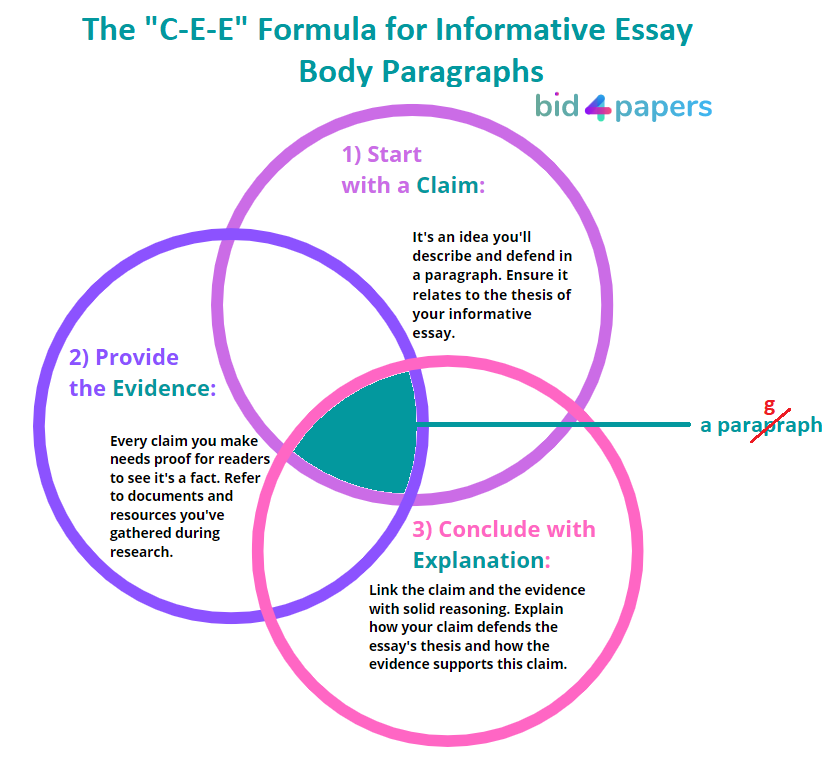
Write a Final Draft and Proofread It
Finally, edit your informative essay before submitting it to a teacher. Read the draft a few times to ensure you’ve told everything about your topic. Answer the following questions:
- Do I have a clear thesis statement?
- Do my essay paragraphs relate to the thesis?
- Have I covered one main idea, supported by evidence and explanation, in every paragraph?
- Are there logical transitions between paragraphs? Have I organized them in logical progression?
- Have I summarized all the thoughts in my essay conclusion?
- Do I use concise and clear language in my essay?
- Have I cited all the resources properly?
And last but not least, proofread your essay. Check it for typos, grammar and punctuation mistakes, redundant adverbs, and other inaccuracies that may influence your final grade for this essay.
Topic Ideas for Informative Essays
Make sure you spend enough time coming up with a good topic. As already mentioned, it’s not as simple as it seems:
It’s critical to find a balance between expository and argumentative topics to ensure yours will be about information, not persuasion or mere description.
For example, a topic like “The best way to deal with unemployment” won’t work for informative essays: It presupposes that you’ll introduce some method being better than others, but it’s about persuasion, not mere information already. At the same time, a topic like “Different methods to deal with unemployment” is okay to use.
Or, let’s take a topic like “Why the government should ban single-use plastic.” It’s more about arguments, not information. However, a topic like “An analysis of the connection between single-use plastic and pollution” may work.
If you find it difficult, go through some informative essay examples to understand what kind of information you will have to find, or go through this list of informative essay topics for inspiration!
Business
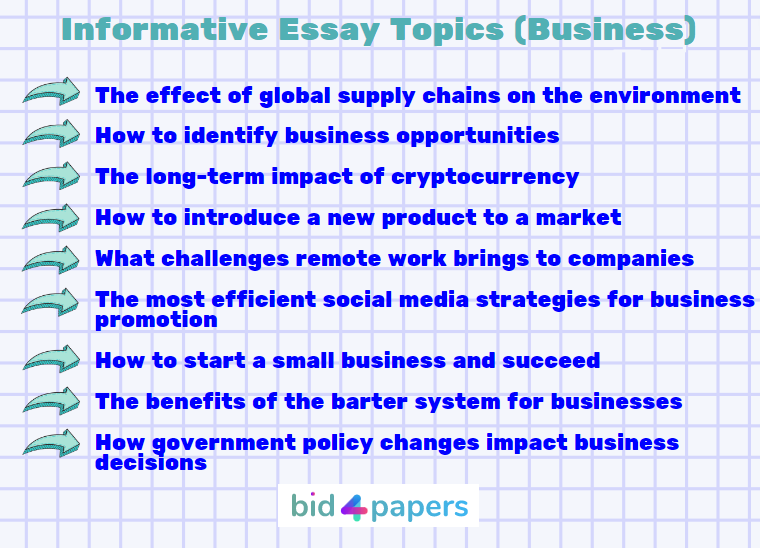
History
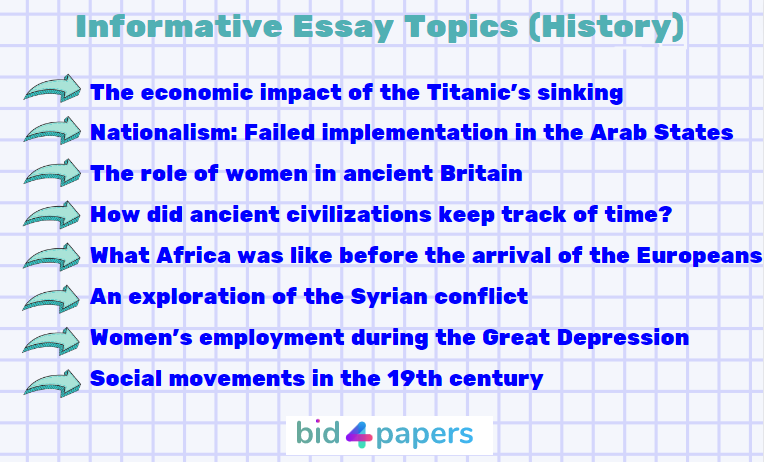
Education
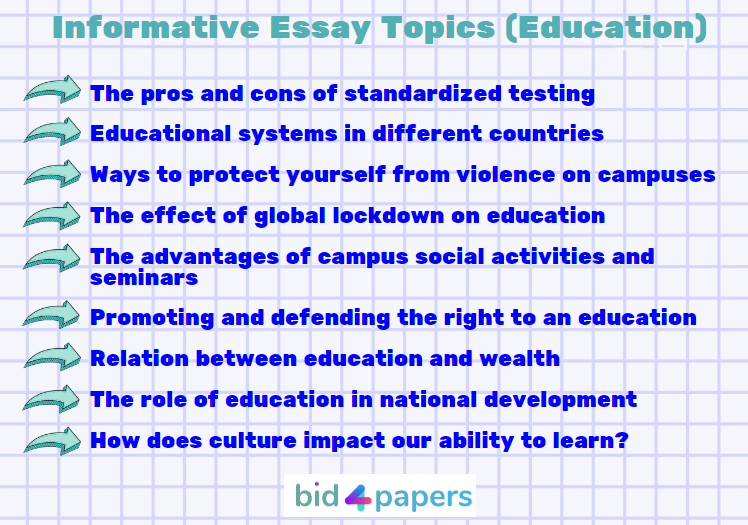
Social
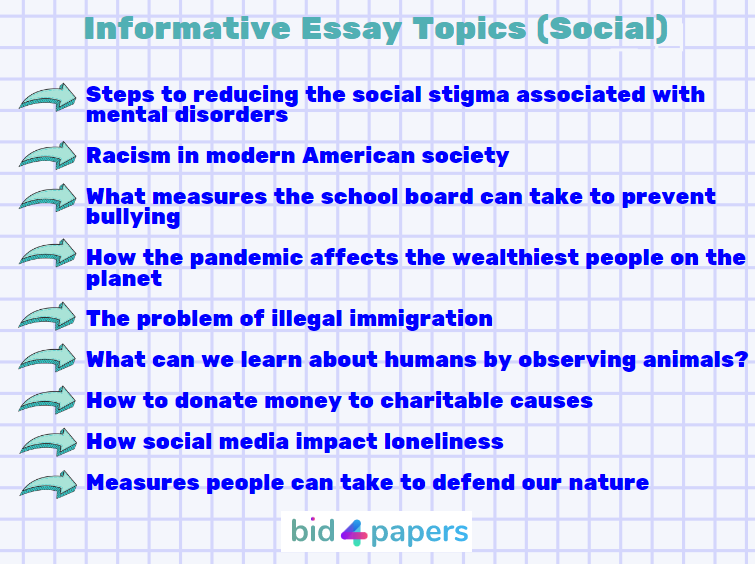
Politics
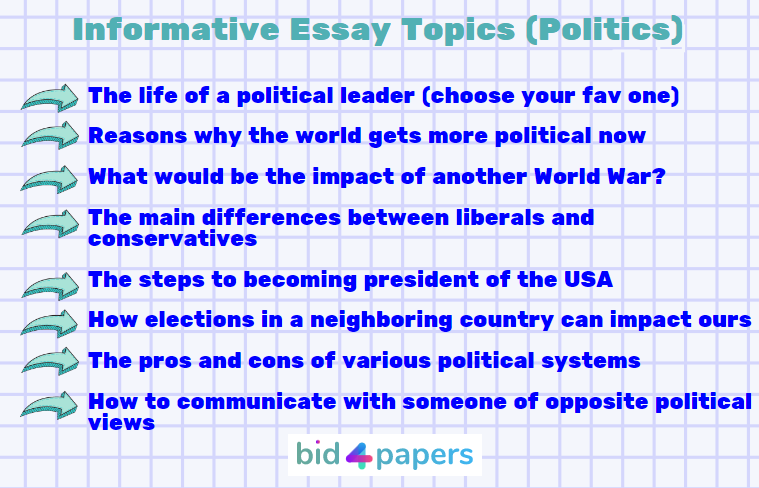
Informative Essay Examples
That’s all well and fine, but are there any examples of informative essays to see what they look like?
Below are three informative essays for your consideration:
(Note! These samples are for assistance only: Please don’t plagiarize them and don’t copy their parts to use in your own papers. Instead, ask our writers for help – and you’ll get an A-worthy informative essay right away.)
Any questions left? We are waiting for you in the comments section!